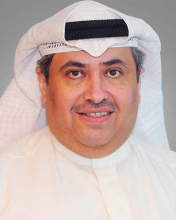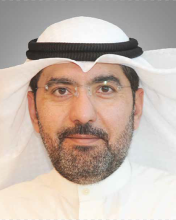Home / Governance
Corporate governance is the system of rules and standards that essentially involves balancing the interests of a company’s management, shareholders and other associated parties. Our corporate governance is a reflection of our value system encompassing our objectives, policies, and relationships with our stakeholders. We are committed to defining, following and practicing the highest level of corporate governance across all our business functions. Integrity and transparency are key to our corporate governance practices and performance and ensure that we serve and protect the interests of our stakeholders.
BOARD OF
DIRECTORS

Fahad Abdulrahman Al-Mukhaizeem
Chairman of the Board of Directors

Waleed Ahmed Al-Mutawa
Board Member

Meshal Abdullah Al-Ansari
Board Member

Mohammad Al-Gaith Al-Tayyar
Board Member

Ahmed Abdulaziz Al-Furaih
Board Member

Meshal Abdulrahman Al-Enezi
Board Member
Arkan’s board of directors consists of Seven members; two executive member, one independent, and four non-executive members and enjoys a diverse range of educational backgrounds and professional expertise, complemented by specialized skills and a deep understanding of the Company’s. The number of directors is sufficient to form the required committees.
Roles and Responsibilities:-
- Approving company major goals, strategies, plans, and policies.
- Acknowledging annual estimated budgets and approving phase and annual financial information.
- Ensuring the company’s commitment to policies and procedures that procure the company’s compliance with internal applicable rules and regulations.
- Safeguarding accuracy and validity of the data and information to be disclosed in accordance with applicable disclosure and transparency policies and rules.
- Setting corporate governance system – without these rules – general supervision thereof and monitoring how effective it is and amending the same, if necessary.
- Pursuing performance of each member of a Board of Directors and executive management member
- Preparing an annual report to be cited in the annual general assembly including the requirements and procedures of completing corporate governance rules and commitment degree thereof
- Forming specialized committees where the period, powers, and responsibilities of the committee are clarified and how the Board shall monitor it
- Ensuring that company-certified policies and conditions are transparent and clear so that resolutions’ taking and wise governance principles are applied. This is in addition to separating powers and authorities of both the Board of Directors and executive management.
- Audit and supervise the performance of executive management members and procuring their accomplishment of all assigned roles
- Set a policy for regulating relationships with Stakeholders to protect their rights.
- Set a mechanism to regulate dealings with Related Parties to avoid conflicts of interest
- Periodically ensure the applicable internal audit systems’ efficiency and sufficiency in the company and subsidiary companies thereof
BOARD
COMMITTEES
The company has formed several committees stemming from the Board of Directors, which help the Board undertake its duties efficiently and effectively.
Audit & Risk Committee:-
Mr. Ahmed Abdulaziz Al-Furaih Chairman of the Committee, independent, non-executive.
Mr. Mohammad Al-Gaith Al-Tayyar Committee member, non-executive.
Meshal Abdulrahman Al-Enezi Committee member, non-executive.
Roles and responsibilities:-
- Review periodical financial statements prior to their submission to the Board of Directors and provide such Board with opinion and recommendation concerning them, in order to ensure fairness and transparency of financial statements.
- Provide the Board of Directors with its recommendations concerning the appointment, re-appointment, or replacement of the External Auditors, and specify the remunerations thereof. Upon recommendation of appointment, it is considered to verify the independence of such external auditors and review letters of their appointment.
- Follow up works of external Auditors and ensure no services other than services related to audit functions are provided to the company.
- Consider remarks of external auditors on the company financial statements and follow-up measures taken regarding them.
- Consider the applied accounting policies and provide the Board of Directors with opinions and recommendations in this regard.
- Evaluate the extent of the sufficiency of internal audit systems in place, and prepare a report including the opinion and recommendations of the committee in this regard.
- Supervise the company’s internal audit department, in order to ensure its effectiveness in performing the operations and tasks assigned by the board of directors.
- Review the results of the internal audit reports and ensure that the necessary corrective actions were taken concerning the observations stated in such reports.
- Verify the company’s compliance with related rules, policies, and regulations.
- Regular meetings shall be held periodically and independently with external and Internal Auditors.
- Prepare and review risk management strategies and policies prior to getting them approved by the board of directors and verify the application of such strategies and policies and that they are appropriate to the company’s nature and level of activities.
- Ensure provision of resources and systems sufficient for risk management.
- Assist the Board of Directors to identify and evaluate the company’s acceptable risk level, and ensuring that the company does not exceed such level after its approval by the Board of Directors.
- Review the organizational structure of risk management and provide recommendations in this regard prior to its approval by the Board of Directors.
- Verify the independence of the risk management employees from activities that result in subjecting the company to risks.
- Verify that the risk management employees fully understand the risks surrounding the company and raise awareness of employees concerning risk culture.
- Review issues raised by the related audit committee, which may affect risk management in the company.
Nomination & Remuneration Committee:-
Mr. Meshal Abdullah Al-Ansari Chairman of the Committee, non-executive
Mr. Abdulrahman Hamad Al-Terkait Committee member, executive
Mr. Ahmed Abdulaziz Al-Furaih Committee member, independent.
Roles and responsibilities:-
- Recommending nomination and re-nomination acceptance for Members of the Board of Directors and the executive management members.
- Setting an apparent policy for Members of a Board of Directors and executive management members remunerations, along with an annual review of the required proper skills needs for Board membership. This is in addition to importing applications for executive positions as required, studying and revising the application, and determining various remuneration categories to be provided for employees
- Designing job description for Executive Members, Non-Executive Members of a Board of Directors, and independent members.
- Ensuring that Members of a Board of Directors’ independence is valid.
- Preparing an annual governance report that includes the total remunerations given to Members of a Board of Directors, and the executive body, and the managers; whether cash or benefits or privileges, of whatever nature and title.
EXECUTIVE
MANAGEMENT
The Executive Management team plays a crucial role in executing the company’s strategic plans and internal policies and controls, ensuring their alignment, suitability, and effectiveness. They oversee the day-to-day operations of the company with the aim of optimizing the same.
Roles and responsibilities:-
- Execute the Company’s strategies and regulations, ensuring their sufficiency and effectiveness. Provide recommendations on improvement when necessary.
- Prepare and submit to the board of directors periodic financial and non-financial timely, comprehensive, and accurate reports that highlight the accomplishment of the Company’s strategies and goals.
- Execute internal controls and risk management systems and ensure their sufficiency and effectiveness.
- Manage all Company’s activities and resources effectively and efficiently to achieve the Company’s strategic goals.
INTERNAL CONTROL
SYSTEMS
Arkan’s internal control systems consist of procedures that are implemented by both management and employees. It aims to increase the efficiency and effectiveness of all operations within the Company, confirm the accuracy and soundness of the financial statements, and commit to the applicable laws and regulations, ensuring the protection of property from damage, loss, or misuse.
Internal Audit:
The internal audit ensures the integrity of the internal control systems, risk management, and governance, assesses the Company’s various operations, and ensures the accuracy of the financial statements.
External Audit:
The Audit Committee gives its recommendation to the board of directors on the appointment or re-appointment of an external auditor and determines their fees after ensuring their independence, and that no services other than audit services are provided to the Company.
Risk Management:
The risk unit identifies, assesses, and monitors risks associated with the Company’s operations as well as prepares periodic risk reports. It is an independent unit with access to all operations within the Company.
Code of Conduct and Ethical Standards:
The board of directors has set forth standards and principles aimed at fostering exemplary conduct and upholding core values, thereby enhancing the Company’s image and reputation. The code of conduct underscores the unwavering dedication of all employees, including board members, executive management, and staff, to adhere to the Company’s internal policies and procedures, as well as the regulatory rules and bylaws.
Whistleblowing Policy:
The whistleblowing policy fosters a supportive and transparent environment for all employees, enabling them to report any concerns regarding irregularities, misconduct, or malpractice directly to the board of directors. These procedures are conducted within a structured framework that prioritizes the protection and confidentiality of the whistleblower, ensures thorough investigation of reported concerns, and provides effective oversight throughout the process. Should you wish to report any such violations, please send email to khalidadnan@arkanalkuwait.com , realestate@arkanalkuwait.com.
Disclosures and Transparency:
To enhance the effectiveness of accurate and timely disclosure practices, the company has instituted comprehensive policies and procedures. These measures are designed to promote fairness, transparency, and the prevention of conflicts of interest and the misuse of insider information. Moreover, the disclosure and transparency policies and procedures govern the dissemination of material information in alignment with relevant corporate governance principles.
STAKEHOLDERS
Arkan respects and always affirms its commitment to protect the rights of its stakeholders in harmony with the laws of the State of Kuwait, the State’s regulatory bodies and the Company’s internal policy and its applicable bylaws.
SHAREHOLDERS
Shareholders seek to raise the value of their investments and contributions and receive a fair return. Arkan’s management takes aims to ensure that the shareholders’ equity is well-preserved, and their profits are maximized.
Arkan is practicing compliance with all the laws of the State of Kuwait, all the provisions of the State’s regulatory bodies, the principles of compliance policy and corporate governance and its internal policies to guarantee their rights without any conflict of interests between the shareholders and the managers of the Company. This allows investors to build trust in the Company’s policies and regulations, fully aware that their interests are in safe hands.
CORPORATE
SOCIAL RESPONSIBILITY
Our social responsibility concept is to contribute to the sustainable development of society by backing up government efforts, contributing to Kuwait Foundation for the Advancement of Sciences (KFAS), Zakat, supporting small enterprise development, allocating funds for charitable investments and endorsing Kuwaiti youth projects. We take into account our vital role in improving the living, social and economic conditions of the workforce of our Company
